Mary Poppins Returns cast defend 'forgettable' songs
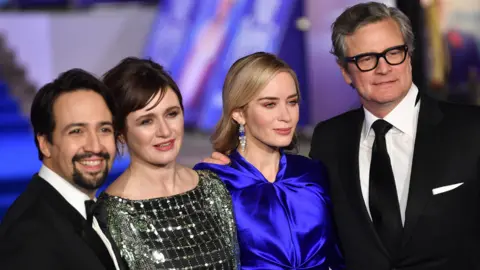 EPA
EPAThere's only one rule laid down to journalists at the press launch of Mary Poppins Returns.
"Don't ask any of the cast to spell Supercalifragilisticexpialidocious."
This point is made by the film's publicists twice over as we arrive and it's clear they aren't joking. Fortunately we think we can live with it.
Emily Blunt, Lin-Manuel Miranda, Emily Mortimer and director Rob Marshall are here to talk about the follow-up to the 1964 classic, which is released in the UK this weekend.
Hollywood may be awash with remakes of films like A Star is Born, Tomb Raider and Ghostbusters, but Miranda insists this is a different beast. It is a sequel, not a reboot.
"That's an important distinction because it's not us trying to improve on Supercalifragilisticexpialidocious," he tells BBC News.
"You can't improve on that, and we know that. The goal is there are eight books by [author] PL Travers, there are some amazing Mary Poppins stories that haven't made it to the screen."
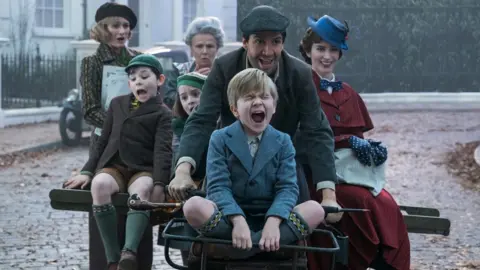 Jay Maidment
Jay MaidmentMary Poppins Returns is set in 1930s London, two decades after the original, with the famous nanny returning to help look after a new generation of Banks children.
Reviews for the film, which is arriving in cinemas 54 years after its predecessor, have been mainly positive.
The Telegraph's Robbie Collin called it "practically perfect in every way" in his five-star rave, while Empire's Olly Richards said Blunt was "impeccably cast as Poppins".
But some critics have focused on the soundtrack, suggesting it doesn't live up to the original.
"The songs of Mary Poppins Returns are almost shockingly forgettable," wrote Alissa Wilkinson in Vox. "I defy you to hum any of the tunes on your way out of the theatre."
The Hollywood Reporter acknowledged: "There's no song as memorably poignant as Feed the Birds," although it praised The Place Where Lost Things Go for "conveying the film's underlying sorrow with a comforting message of hope".
The new score has been written by lyricist Scott Wittman and composer Marc Shaiman, who are best known for Hairspray.
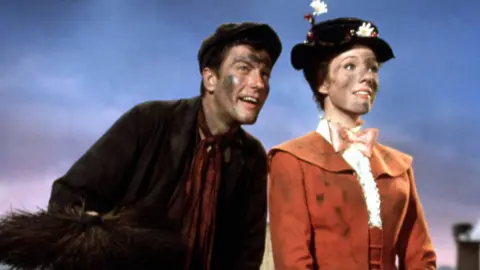 Getty Images
Getty ImagesTaking on songwriting duties is no small feat, considering that the original Sherman brothers' score is widely regarded as one of the best ever for a screen musical.
"I think it's a fantastic score, I really do," says Marshall, who also directed big-screen musicals Chicago, Nine and Into the Woods. "We didn't set out to make them stand-alone songs, because that doesn't work for a musical.
"What works for a musical is when they're integrated into the story. But I will say they're so tuneful, so clever, so smart. And they're beautiful, so I think the more people hear the songs, the more they'll be part of their lives."
They may well be tuneful and cleverly written, but could they realistically have the same longevity as those in the 1964 film?
"I think so," says Mortimer, who plays the children's aunt Jane. "I remember hearing the [new] soundtrack for the first time, and I was just blown away.
"They were beautiful songs and they're songs that really do stay in your head - and, like the first movie, each song is incredibly wry and funny and sophisticated, with the use of words and storytelling through the songs, and yet they've all got a message that's quite deep about life and how to approach things."
She adds: "I do feel confident that the soundtrack is going to be a big part of people's lives for years to come."
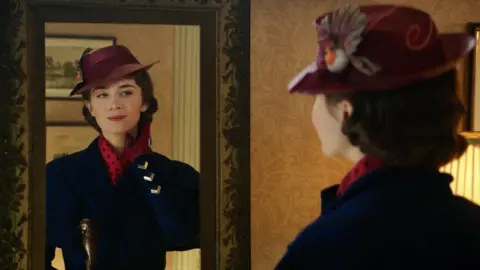 Disney
DisneyIt seems the Academy Awards music branch agrees. When the Oscars longlist was revealed on Tuesday, Mary Poppins Returns was the only film to have two tunes in the running for best original song.
Miranda similarly thinks the songs will last, but adds: "Of course, only time will tell.
"I think it was an incredibly smart decision to hire [Wittman and Shaiman]... it's just such a love note to the songs in the first one, I'm really proud to sing them."
Music aside, most of the attention with the new film has focused on Blunt herself, who takes over the role made famous by Dame Julie Andrews.
She has received mostly positive reviews - but the BBC's arts editor Will Gompertz said her performance "misses the mark," while others argued the lead role is actually rather limiting for her.
'Stern but generous'
"For someone with her extraordinary range, the part is like a straitjacket," wrote David Edelstein in Vulture.
"Ordering the children about, her Mary puts on a stern face and freezes her scowl in place, then gives a tiny smile when their backs are turned - a shtick she repeats with diminishing returns."
But Blunt tells BBC News in response: "I don't see her as just stern and all of that. She's a woman with a coat of many colours, really. What I love about her is that duality that she has.
"She is stern, she is buttoned-up, poised, holds everything at arm's length. But yet, how generous she must be to come into people's lives and inject it with fantasia and magic and a sense of wonder."
Mary Poppins Returns is part of a musical resurgence on the big screen - something Marshall welcomes.
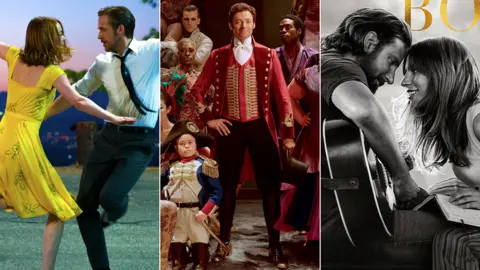 Lionsgate/20th Century Fox/Warner
Lionsgate/20th Century Fox/Warner"I remember when I did Chicago years ago, I was told the genre is dead because audiences weren't accepting people singing on screen," he recalls.
"But I think it's never the genre that's the problem, it's how it's handled. You've got to be very careful when you do a musical because a bad one doesn't work. But when it does, it feels seamlessly created - where you have dialogue move very seamlessly into song and back into dialogue.
"It should feel like one way of telling a story. It shouldn't feel like a piece has been applied and pushed, it should feel like a natural, organic experience."
For Miranda - best known for creating Hamilton, one of the most popular shows in the West End - the more musicals that make it onto the big screen the better.
"I think I'm really proud that we're part of this resurgence. As someone who works really hard to make musicals, it's a win for me," he says.
"And also I think it continues to resurge as long as we continue to innovate in our musicals.
"The Greatest Showman is different from A Star is Born, is different from La La Land, is different from Mary Poppins Returns, and I think as long as we keep pushing the boundaries of the kinds of stories we're supposed to tell, we can continue to enjoy this renaissance."
